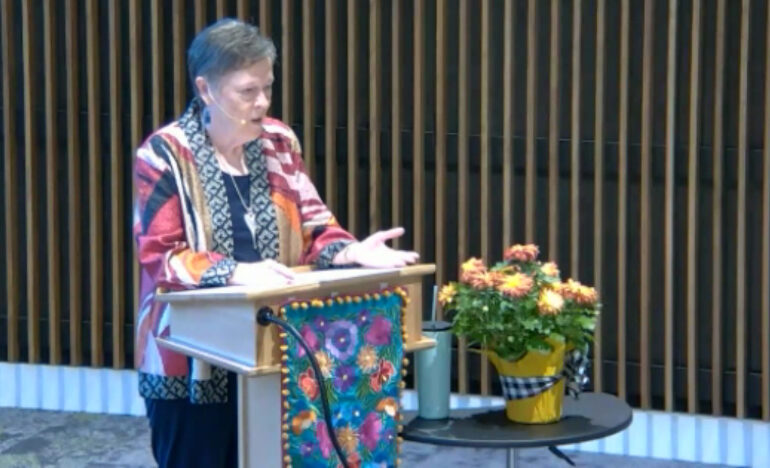The Islamic View of the Afterlife

By Kathy Keary
Part 20. The full series is here: The Contemplative Spirit of Islam.
As we conclude our series on Islamic spirituality, we turn our focus to the afterlife, a mystery that we often ponder when a loved one has died or when we find ourselves in a life-threatening situation. I refer you to my previous article pertaining to a tender dream I recently experienced about a dear friend’s death that included comforting insights into the hereafter. Glowing Among Us: My experience of the visible and invisible – Precious Blood Renewal Center (pbrenewalcenter.org)
Burying the deceased immediately upon death is the customary practice of Islam. The Qur’ān explains that the soul is warmly received by God and then placed in quiescence known as Barzakh to await the Day of Resurrection.
The end of the world is known as the Day of Judgement or the Day of Gathering. Prior to this day, chaos and injustice will rule the world. It is believed that Jesus will return to earth followed by Mahdi, a descendant of Muhammad. Both figures will bring justice and equity to the land. The world will then experience a series of cataclysmic events described in the Qur’ān as “when the heaven is split open, stars are scattered, seas swarm over and tombs are overthrown” (82:1-4) (Out of Darkness, 104).
The Day of Resurrection and Judgement follows. All will rise from their graves and appear before the angels and the Divine Judge to be held accountable for their deeds and misdeeds. Jamal Rahman describes this occurrence as a time when “what is in people’s hearts will be brought to Light and every part of the body will testify even against itself” (Out of Darkness, 105). Of importance that day will be the way we lived, how we used our knowledge, how we acquired and spent our money, and the care we took of our body (Gems, 207).
The Qur’ān repeatedly assures that “God does not wrong anyone as much as an atom’s weight “ (4:124), and “whoever brings a good deed shall have ten the like of it” (6:160). Evil deeds will be punished according to the severity of the transgression and no more.
Heart wrenching indeed, the Qur’ān highlights one particular transgression as the epitome of evil – the burying at birth of unwanted baby girls, a practice of pre-Islamic Arabia. Rahman asserts: “In view of the reality that many women still are “buried alive” metaphorically, it seems significant that of all the evils that could be singled out for punishment, the crime against female infants is the one that was deemed appropriate for revelation in the Qur’ān” (Out of Darkness, 105).
Note: Never miss an article published on the Renewal Center website: Sign up to receive our newsletters.
Some will enter heaven and others hell at the conclusion of Judgement Day. The Qur’ān describes heaven as a place with charming palaces and breathtaking gardens nourished by flowing rivers. In contrast, the Qur’ān describes hell as a dreadful place with frightening images (Out of Darkness, 105, 106). The Qur’ān reveals that the righteous “will be in bliss” and the evil “will be in Fire” (Gems, 207). It is widely believed that metaphorical language is used in the Qur’ān to describe heaven and hell using words and images that we can comprehend. (Out of Darkness, 106, 107).
Awe-inspiringly so, Muslims believe that there are seven levels in heaven. We are placed in a certain level depending on our actions while we are on Earth; however, we continue to evolve into perfection and enhanced intimacy with God spiraling to higher levels of paradise.
Rahman’s description of hell is both reassuring and heartwarming:
Spiritual teachers tell us that hell is, surprisingly, a place of divine mercy. It is a womb of nurturance, radical recovery, and wholeness for those whose hearts have hardened because of life circumstances…Those assigned to hell are actually spending a gestation period in a womb of creative compassion before continuing on the journey of union with God (107).
Even though all the major faiths weigh in on the afterlife, in all reality, what happens after death is sheer mystery. The Qur’ān states, “For with God are the keys to the Unseen: the treasures that none knows but He” (6:59). But both the Qur’ān and Islamic mystics assure us that our God is overflowing with unbounded compassion warmly greeting each soul with love. This I truly believe.
While exploring Islam the past several months, I have been deeply enriched by the writings of Jamal Rahman, the Muslim Sufi interfaith minister I frequently quoted. His website is filled with meaningful meditations, videos, publications, and practices as well as a listing of his books. This would be a good place to start if you desire to delve further into the study of the beauty of Islam. Jamal Rahman is a Muslim Sufi interfaith minister
Next week we will begin a study of the contribution that Judaism offers for those in pursuit of a contemplative lifestyle. I hope you will join me.
References
Rahman, Jamal; Elias, Kathleen Schmitt; and Redding, Ann Holmes. Out of Darkness Into Light: Spiritual Guidance in the Quran with Reflections from Christian and Jewish Sources. Harrisburg, New York: Morehouse Publishing, 2009.
Rahman, Jamal. Spiritual Gems of Islam: Insights and Practices from the Qur’an, Hadith, Rumi and Muslin Teaching Stories to Enlighten the Heart and Mind. USA: Skylight Path Publishing, 2013.
Kathy Keary, a Precious Blood Companion and spiritual director, holds a Master’s Degree in Theological Studies and is a graduate of the Atchison Benedictines Sophia Center’s Souljourners Program, an intense study of spirituality and spiritual direction. Kathy believes that the Divine is present and active in all of life and encourages others to be awakened to the God in all including the divine within. She enjoys accompanying others on their journey to wholeness discovering the person they were created to be.
Photo 53562879 / Heaven © Krischam | Dreamstime.com
We’d Like to Hear from You!
We’d like to know what you think about this article. Send us a comment using the form below. Do you have a suggestion? Is there something you want to learn more about? Send us a note.
Related

Discover Lectio Divina
Presented by Kathy Keary
This is a recording of “Discover Lectio Divina” presented by Kathy Keary at Precious Blood Renewal Center in Liberty, Missouri, on Oct. 2, 2025.

Do You Hear What I Hear?
By Fr. Garry Richmeier, C.PP.S.
How can we avoid the harmful affects of the polarization that characterizes so much of our lives these days? One step toward this end is to cultivate a greater understanding and appreciation for the idea of relativity in human behavior.
Categories
Assembling God's Puzzle Coffee with Padre Cooking & Spirituality Encounters of the 4th Kind Family Matters Guided Meditations Reflections on the Eucharsitic Prayers Spiritual Resources Taize Prayers Teach Us to Pray The Contemplative Life Traveling with Pilgrims of Hope Uncategorized Videos Week of Prayer for Christian Unity When you need a little help
